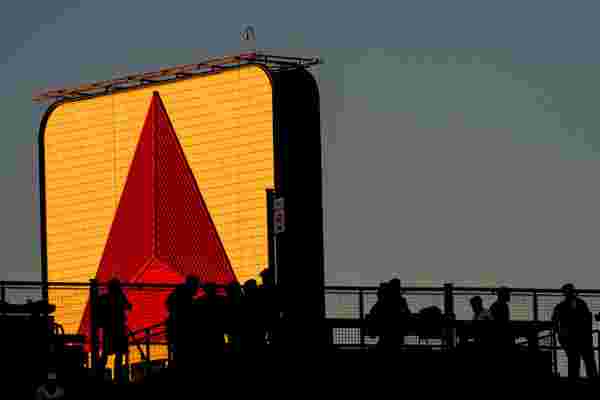Inside the Battle Raging over Boston’s Iconic Citgo Sign
The 3,600-square-foot Citgo sign that towers over Boston 's Kenmore Square is embroiled in a controversy that poses one question: Can a company's logo be considered a work of historic public art, or is it always merely an advertisement? To Bostonians who hold a special place in their heart for the illuminated orange-and-white sign—a beacon over the city since 1965, when the current sign, designed by Arthur King, replaced a 1940 version that read "Cities Services"—the answer is both.
"It has transcended its utility as simply advertising," says Greg Galer, executive director of the Boston Preservation Alliance. "In the mind of Bostonians and others outside the district, it's superseded its perspective of an ad, and it's seen as an icon of the city. People say 'the Citgo sign' as if it's one word, and don't think about buying gas or oil."
And it's not just New Englanders who think that way.
"Ads have always been art," says Nancy Maren, executive director of the United States Sign Council, which is based in Bristol, Pennsylvania. "I would say it's not just art, and an ad, but it is a symbol that the city has come to identify with."
So why the uproar over a sign? The debate heated up last October, when Boston University sold the building that holds the Citgo sign, 660 Beacon Street, along with eight other properties to Related Companies, a New York-based real estate development firm, for $134 million. Citgo was paying B.U. an annual lease of $250,000—a price that's considered significantly below market value. Related Companies started negotiations to increase the yearly lease to a number around $2.5 million per year, sources close to the matter told AD . (Related Companies disputes this figure.) With only a few gas stations in the metropolitan area, Citgo claims they can't justify spending that much money, in addition to the nearly $250,000 per year it costs to operate and maintain the illuminated sign. Since then, a public campaign has sprouted to get the sign named as an official landmark, with a petition comprising over 14,000 signatures in support of keeping the sign as and where it is. But critics claim the the Houston-based, Venezuela-owned petroleum company is simply tugging at the heartstrings of Bostonians who have sentimental connections to the sign in an attempt to avoid ponying up the escalated rent price.

“The previous lease for the privately owned commercial sign on the rooftop of 660 Beacon Street expired in 2016 and we have since been executing short-term lease extensions as we negotiate a longer-term lease," Related said. "We remain in active, good-faith negotiations with Citgo—the state-owned oil company of Venezuela—and have offered them a long-term lease at significant discount to market, as determined by an independent, third-party appraisal."
Meanwhile, Citgo considers its deal with Boston University to have been merely a lease of roof space, not a major media play.
"Our agreement with B.U. was a simple lease of the rooftop of 660 Beacon Street," the company said. "It was never a marketing agreement whose value was based upon advertising impressions. The new owner, Related Companies, seeks to re-characterize the roof lease into an advertising agreement and to increase the rent nearly tenfold."
However the debate unfolds, it's safe to say that most of the public will continue to express their adoration for the glowing North Star of Kenmore Square. One of those admirers is Abington, Massachusetts, resident Ellen Delany. Every September when she participates in the Jimmy Fund Walk , she says she looks up at the Citgo sign and cries in memory of her father, William Byrne, who was one of the sheet metal workers with Local 17 who built the original Cities Services sign in 1940.
"Every time I went to a ball game I took a picture of it for him," says Ellen, whose father died six years ago at age 98. "It's art for sure."